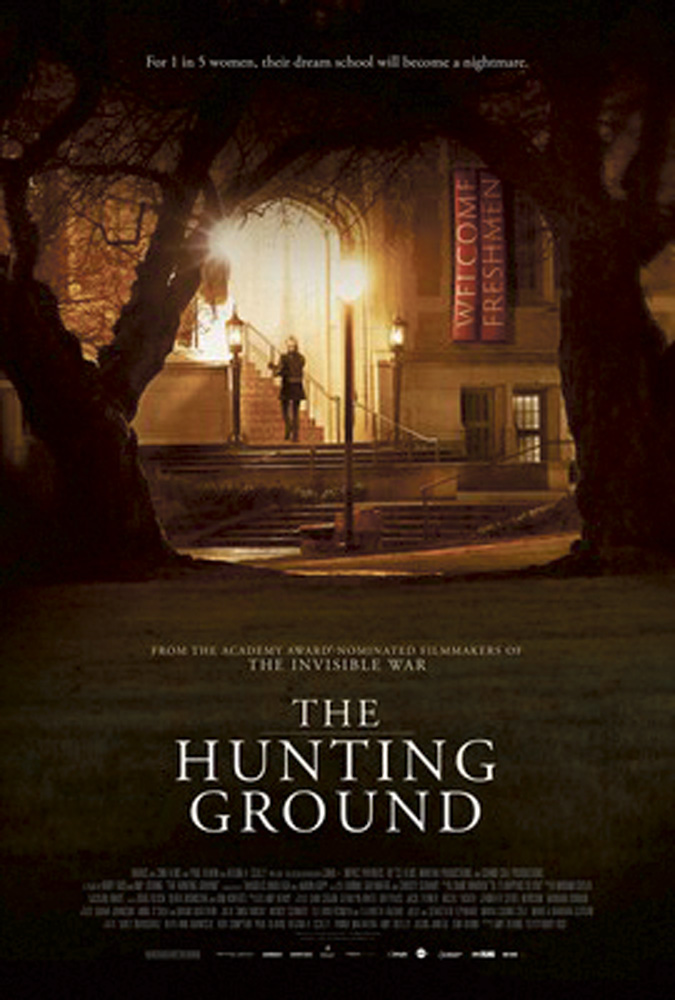Miguel Rodriguez
Staff Writer
On college campuses, sexual assault is both a hot-button topic and a serious issue. However, this is not an easy subject to discuss. This is a multi-pronged issue that expands beyond the initial incident. Across the country, survivors are coming together to fight not only the rape culture they allege is perpetuated but also the response — or lack thereof — by the university and authorities.
Now enters The Hunting Ground, a documentary film consisting of compiled footage along with survivor and expert testimonies that was shown on campus on April 1. The Hunting Ground is written and directed by Kirby Dick and produced by Amy Ziering, and is available to stream on Netflix.
The film follows undergraduate survivors Andrea Pino and Annie Clark who, after their respective experiences, continue with their education while simultaneously struggling to uphold justice. The film focuses on the pattern seen throughout history of what the mission statement describes as “institutional cover-ups, rationalizations, victim-blaming, and denial that creates perfect storm conditions for predators to prey with impunity.”
The film details the struggles of several people — male and female — who chose to speak out and were swiftly condemned or ignored. While each experience differs, the common denominator seems to be a pressure to keep quiet. Some have faced scorn from friends and others in their social lives for making an accusation, or from higher powers that act in the interest of reputation and finances.
One story details the hurdles a victim placed because the perpetrator in her case happened to be an athlete. Multiple survivors recount being left out of the litigation process altogether, or being harassed by emergency responders asking irrelevant — and what they found to be offensive — questions.
McKarah Dreyfous, one of the producers of The Hunting Ground, first got involved with the documentary after viewing The Invisible War at the Sundance Film Festival in 2012. Dreyfous filmed an event held at the University of Oregon that addressed a sexual assault case that had been discussed for months at the time.
Dreyfous says that meeting survivors of sexual assault helps other victims become stronger and more independent, and, by seeing others grow past the traumatic event, find hope in themselves.
Working at Planned Parenthood for two years also gave her an appreciation for the gravity of reproductive rights and the obstacles women face to exercise them. She started out on the project by driving around Diane Warren, the writer of the film’s theme song “Till it Happens to You,” which was performed by Lady Gaga at the Oscars.
“The movie had a huge impact on my life, because I myself was assaulted the summer going into my senior year of high school,” Dreyfous said. “By meeting the other survivors in the film and see[ing] the impact it has made, I have become a stronger, more independent woman within society and feel more secure about myself.”
The film highlights the value that is placed on public image, and how it leads to reported cases being swept under the rug by university figures. Large establishments like companies and big universities do not want their names and reputations tarnished, and formally acknowledging rape accusations costs them significant funding and sponsorships.
Furthermore, people often wish to distance themselves from such a heavy topic. This is often manifested in victim blaming. It is theorized that people tend to blame the victim in order to make themselves feel more separate from them, that they are somehow less vulnerable to being subjected to the same kind of ordeal. This often pressures rape victims to suppress their feelings and dissuades them from taking legal action.
A crucial part of this project is exposing the underlying forces of systematic discrimination against survivors. People like the minds behind The Hunting Ground are working to create a safer, more accepting environment for victims and hope to bring justice for those who have been wronged.
“This film has the potential to impact thousands of young people, specifically young men that can realize how harmful sexual assault can be,” Dreyfous said. “I want the film to show all human beings how damaging sexual abuse can impact people’s lives. No one deserves to be mistreated and misused.”
This is a national conversation of great relevance to all students, and it is not the first time the issue has been debated at University of California, Santa Barbara. In May 2015, a group of students held a 13-hour sit-in at Chancellor Yang’s office and spent five hours negotiating their list of demands before emerging triumphant.
The demands included immediate suspension for perpetrators found guilty, immediate removal from housing, mandatory increased training on consent, as well as unhealthy relationships, the creation of a survivor fund and a quarterly report on the number of cases brought to the university.
While great strides have been made with the issue, there is much work to be done. The Hunting Ground ends with a recording of a voicemail a distraught father left for Pino and Clark requesting help for his daughter, who was just assaulted at UCSB.











